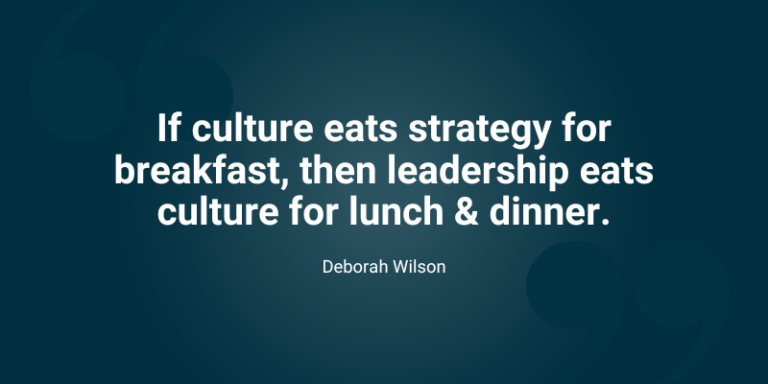

Executive Recruitment in Brisbane: Finding Top Talent for Your Business
Within Brisbane’s business scene, securing top executive talent through executive recruitment can be the key to unlocking success. Whether you’re


In May, the Governance Institute hosted their annual, state based “Governance & Risk Management Forum” and Deborah Wilson was invited to present on “Rebuilding Organisation Culture”. Despite the late hour and the nebulous nature of culture, Deborah engaged the audience with a fun and interactive session. Her goal was to convey the message that culture encompasses more than just staff opinion surveys and superficial values displayed on office walls. To set the stage, the audience was playfully bestowed with the title of ‘Chief Culture Executives,’ and their enthusiasm and active participation was commendable.
Although the audience of governance and risk specialists, executive leaders and board members brought a solid understanding of what organisational culture is, she emphasized a common oversight among governance professionals: neglecting the culture within the boardroom itself.
She emphasized that building an exceptional organisational culture is a time-consuming process, whilst its destruction can occur overnight due to the actions of a few individuals. Recent news stories serve as a stark reminder of how a company’s longstanding reputation and brand can be quickly tarnished if the wrong culture takes root. Rebuilding a damaged culture can be a lengthy endeavour. In today’s corporate landscape, organisation culture is a critical asset that demands significant long-term investment in cultivating and perpetuating and should be considered a part of the risk register for any business.
Renowned management guru Charles Handy’s definition of culture is “the way we do things around here” resonated strongly with the audience. It captured the notion that culture is shaped by the day-to-day behaviours and practices on the shop floor, experienced firsthand by employees, customers, stakeholders, and shareholders. Culture represents the collective embodiment of an organisation’s values, policies, procedures, assumptions, and norms, defining its unique character.
Drawing from Peter Drucker’s famous quote, “Culture eats strategy for breakfast,” Deborah highlighted the pivotal role of the boardroom in setting the tone for a positive culture. The board serves as the catalyst by establishing, monitoring, and measuring an organised, transparent, and intentional corporate governance framework. The independence of directors proves advantageous in overseeing culture-related activities, enabling the C-suite and leadership to foster the positive elements of culture. Citing an article by SpencerStuart, Deborah emphasised the link between corporate culture and long-term shareholder value, emphasizing the need for the board to give culture a permanent place on its agenda.
“Companies with a strong corporate culture see a 4x increase in revenue growth compared to companies with a weak culture.
(source: Harvard Business Review)
Teams with a strong sense of shared purpose and values have a 17% increase in performance compared to teams without a strong sense of purpose and values.
(source: Harvard Business Review)”
Deborah outlined the board’s responsibilities in determining and shaping culture:
To establish a baseline understanding of the organisation’s progress, she stressed the importance of using a tool for culture mapping. This invaluable technique provides a comprehensive overview of the current culture, highlighting areas of strength and areas that require attention. OnTalent offers a range of tools and layers for Culture Mapping, including decision-making, priorities, rituals, meetings, feedback, norms and rules, behaviours, and psychological safety.
Referencing articles and studies, Deborah emphasized the need to measure culture from an investment perspective.
“Culture is an ultimate intangible that cannot be forced or superficially addressed. Ignoring culture comes with grave consequences, making it a crucial consideration for board members.”
In conclusion, Deborah emphasized that if culture eats strategy for breakfast, then leadership devours culture for lunch and dinner. Good leadership is vital at every level of the organisation, from the boardroom to the front line.
If you would like to discuss how OnTalent can support your organisation on their culture journey, please reach out to Deborah Wilson via [email protected] or 07 3305 5800.
Deborah Wilson
Head of Careers, Leadership Strategy, Development & HR Consulting
OnTalent


Within Brisbane’s business scene, securing top executive talent through executive recruitment can be the key to unlocking success. Whether you’re


The landscape of talent management is dynamic, and organisations must be proactive in identifying and nurturing future leaders to ensure


So many of us are resistant to change and it’s not hard to understand why: it can be confronting when

